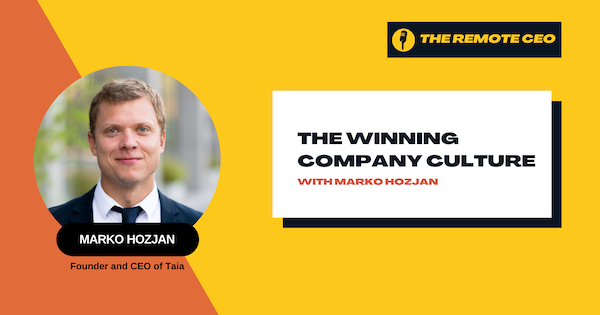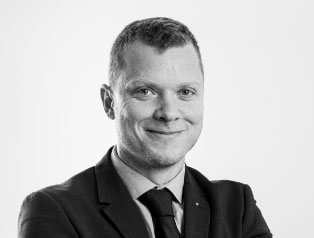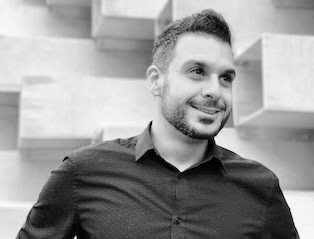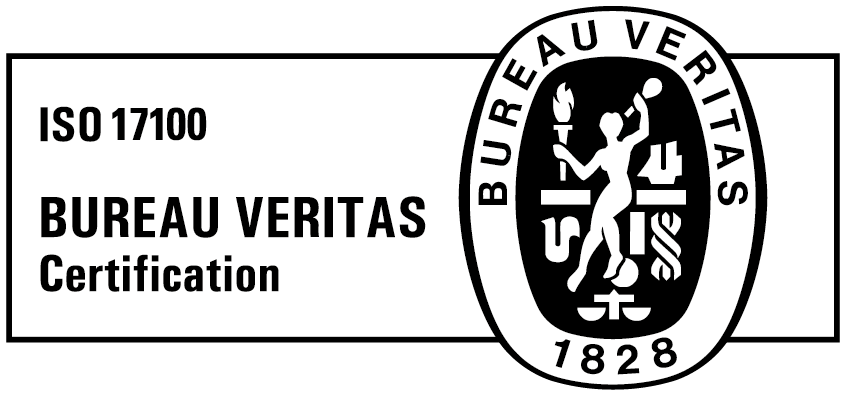Podcast
Remote CEO Show Featuring Marko Hozjan: Creating a Winning Culture
Marko and Deniero discuss how to create a winning company culture and be a leader of a remote international team. Marko opens up about his background and why he founded Taia Translations. He shares his biggest entrepreneurial mistakes and what he would do differently as an experienced leader today.

“When speaking about project management or communicating with clients and so on, we try to use different time zones to our advantage so that we would widen the availability for our clients that are from different time zones. So actually, we got only positive things out of this that our team is from different time zones. No negative ones. ”
Marko Hozjan, Co-founder and CEO @Taia Translations

Marko Hozjan
Co-founder / CEO @Taia
Marko Hozjan is a serial entrepreneur and the co-founder and CEO of Taia Translations, a company breaking down language barriers with the help of Artificial Intelligence, translation memory, and a team of highly experienced translators.

Deniero Bartolini
Founder / CEO @Gold Rush Social
Deniero Bartolini is the founder and CEO of Gold Rush Social. Toronto-based marketing agency helping eCommerce businesses hit 7-figures. He is also the founder and host of the Remote CEO podcast show.
What you'll learn
- Marko’s back story and how he decided to make Taia Translations.
- How Taia can help your business go beyond your local border and enter new markets.
- Why Covid had practically no effect on the company.
- How to lead an international team completely remotely and in a flat organization.
- Why Marko does not believe in micro-management and neither should you.
- How to create a winning company culture during the pandemic.
- Top 3 mistakes Marko did while scaling a business and what he would have done differently today.
- Why you should look for talented people in less developed countries.
- How Machine Translation will revolutionize the world, and why Taia wants to be a part of this revolution.
Resources
- Marko Hozjan, Taia’s Co-founder and CEO
- Deniero Bartolini, Founder and CEO of Gold Rush Social
- Listen to the episode on Apple Podcasts
- Listen to the episode on Spotify
- Explore Taia and learn more about what we do
- Translate your files internally with Catapult
- Get an Instant Quote for your translation demands
Transcript
Intro:
Welcome to the remote CEO show. My name is Daniel Bertolini, a.k.a. De Niro B. I’m an acclaimed business coach and my moonshot is to change the face of work in business or ever with. Each episode would bring you some of the most inspiring and insightful interviews, with six, seven, eight, and nine-figure entrepreneurs to crack the code on how to build your remote empire and have fun while doing it. Thanks for stopping by. And let’s get started.
Deniero:
What is going on CEOs, De Niro B. is here with another episode of the remote CEO show today. I am here with Marko Hozjan. Marko is a manager passionate about leadership and business processes. Serial entrepreneur with a demonstrated history of founded companies and exits. He’s also an experienced sailor and a bookworm in topics of leadership and marketing. I can’t wait to have this chat, so let’s get right into it. Marko, thank you so much for being on the remote CEO show. How are you doing today?
Marko:
Thanks for having me. Very well. So the sun is shining. Finally, because I live in Ljubljana, Slovenia, the winters are usually very foggy, and when I travel to London, it’s similar. So I’m very happy to see blue skies today.
Deniero:
Yes, for sure. As we’re speaking, the sun is literally shining in my eyes as well, so I know exactly how you’re feeling. So Marko, again, thank you so much for being here today, and like I always ask every single one of my guests, can you give us a bit of a background about your story before you started Taia and what made you start this business?
Marko:
Sure. So my whole story, I guess this is my interpretation of entrepreneurship starts, with my very early years because I lived with my mother and we were actually very broke my whole childhood. So, I very early on decided that I’m not going to be broke in my life. So my entrepreneurial path started very early, selling CDs downloaded from… Downloaded with downloaded music from Napster at the time. And then I founded my first company at 21. So, now I think I have about a record of seven founded companies. Two of them sold, so I have sort of two small exits. The first was a marketing agency, the second was a nautical school here in Slovenia and Croatia. I founded a language school, et cetera. So a couple of companies. But what’s a common denominator with all of these companies is that they weren’t scalable. So I was looking for something that is. And now for the last three years, I’m the CEO of Taia, which finally I believe is a scalable company. So it’s a translation platform and we’re getting more and more into SaaS. So I’m really happy that finally, I’m working on a project that is what I see nowadays entrepreneurship should look like.
Deniero:
Awesome. This is very interesting. We’re going to get into how you’ve been running your business because you’re the remote CEO. We’re all about helping our listeners figure out how they can run their own remote businesses. But before we get to that, I want to talk about Taia like what this business does, what this product does. So can you give us a snapshot of what this software can do?
Marko:
Sure, it’s a platform made for businesses, so when you get into a platform, you have to choose, for example, what do you want to translate on your own or in the house or do you want to outsource. If you want to translate in-house, we have a tool or variety of tools where you can just drag and drop any kind of document. Of almost any kind, almost 70 file types are supported. You can drag and drop a document. Your document is pre-translated by machine translation. You just correct it like post edited. You download it and you get that document back in the same formatting. Whether it’s an office document, a code, a PDF… So 70 file types are supported. And the other part is sort of professional human translations if you need to outsource because companies in different times need different services. Today the marketing department needs a top-notch catalog translated, it needs to be flawless and the next time they need to translate something internally. The next time they are e-commerce, they have a lot of content where the quality isn’t needed, so the quality isn’t supposed to be really, really good. The cost is more important. So it really depends… The platform offers a variety of services that you can choose from. So we want to be an all-stop shop for your translations.
Deniero:
It’s a very interesting system. So like you have both the machine doing a translation for you and then you have basically almost like a platform where translators can go in and kind of get work, basically. And then you are also, of course, offering the service. That’s a very interesting business model. You said you’ve been doing this for three years, and before we started the recording, you were telling me that you were already doing all of this remotely long before COVID. Is that correct?
Marko:
Yes! I think it’s all connected to the values that we set up early when the company was founded. So we tried to have very liberal, very, very motivated 3.0 scrum agile values at the beginning. And when you build these values, for example, autonomy is very important. You don’t measure hours, you measure KPIs, you don’t measure location, you measure if the tests were done. So very early, it was obvious that we don’t need to measure how many hours people work per day. That people don’t actually need to be in the office so we can offer all of that freedom with autonomy that comes with scrum, for example. And with that came automatically that we could hire internationally. We didn’t have to hire locally in the UK or Slovenia. We could do it internationally. So even today our team is from… some members are from Cyprus and from Spain and from the UK, some from Slovenia and so on. And it’s how we started. So when Covid came organization-wise for us, nothing changed. Of course, for our customers, there was a whole collapse and a lot of projects were canceled and so on. But for us, we have all our software in the cloud, everyone has a laptop, so it actually doesn’t matter. The only thing that was a bit impacted was the culture itself because we could see each other a bit less, but we remedied that with all-hands meetings that we had every Friday, for example, or even when we had a chance when all of the countries where we have people from, where there was a release from COVID measures, we would immediately gather in one place, have a party, have a gathering and so on. So actually, it was an interesting experience for us, for an experiment, and it worked flawlessly.
Deniero:
That’s very interesting. And so let me ask you a question about your team. So how many different countries collaborate on this project? Where are they from?
Marko:
Mm-Hmm. For now, it’s four different countries, but we have people from South Africa, from the US, Spain, UK, so very, very different. So some people that live somewhere are originally from somewhere else. So we’re a very multi-national company. And of course, our official language is English, and that’s it.
Deniero:
Yeah, that’s very interesting. And so I wanted to ask you a question about synchronous or asynchronous work. I know there are a lot of business owners after they went into lockdown. This is in 2020, early 2020. They were almost like forcing staff members to work at the same time because the usual reasons that they will give you, like, for example, we need to have meetings, we need to make sure that if you know someone needs something, we need to hop on a quick call and your availability. But from what I understand, because you’re basing the success of your business around specific KPIs, then I was wondering, for example, someone that is in the United States. I know, for example, South Africa and Spain, you know where you are located right now, too, they’re all within either the same time zone. Or maybe you if you go to the UK one hour behind. But in the US, we’re looking at a six to nine-hour difference. So do you really care about people working at a specific time altogether or do you try to tell people like you said, do whatever works for you basically?
Marko:
So we leave it to teams actually, so for example, our sales team currently… One of our BBMAs, is in Canada because he’s Canadian, and part of the team is in Spain and a part of the team is in Cyprus. So we have three different time zones that go from Cyprus to Canada. So very different. Actually, it’s a 10 hour spent. I agree so meetings are important… Now and then, which means that whenever we had a meeting, we tried to synchronize so that it was OK for everyone. So it means that the Canadians had to get up a bit early and the others needed to work a bit later. But otherwise, when it comes to KPIs, it’s really not that important for us. Actually, we try to embrace this change and get the best out of it. For example, when speaking about project management or communicating with clients and so on, we try to use different time zones to our advantage so that we would widen the availability for our clients that are from different time zones. So actually, we got only positive things out of this that our team is from different time zones. No negative ones.
Deniero:
Yes, for sure. As a matter of fact, I remember as a remote business coach myself, one of the techniques that we’ve used in the past to help business owners have a 24-7 tech support team at their disposal was to hire three people in three very different time zones to cover those three eight hour shifts. We literally could create a 24-7 office, so to speak, or a virtual office with little to no effort and a very small budget. And it absolutely makes total sense what you’re telling me right now.
Marko:
Yes, this is a great example.
Deniero:
I want to know more about how you operate. Do you use only email or do you have systems like, for example, Trello or Asana or Monday or Todoist? Is there a specific way that you organize your workflow within your teams?
Marko:
Sure. So firstly, we try to use email as little as possible, so firstly, there’s chat, so we use different providers from Slack to Discord or whatnot. Chatting is very important because we try to use the chat for everything. So even the document transfers, etc. But since we built our own CRM slash transaction management system slash ERP Taia, has become much more than just the translation management system. We do most of the work in there, so combining our own system with a chat and with, of course, other systems that we use for projects, we use Asana, we do. And then we combine different stacks. For example, we use Zapier to connect different plugins that would work for us. It really depends on a… Maybe even a period, so there is a period where we need certain software more than others. So for example, for a certain time we used, we tried Notion and then… So it really depends, but we combine Asana or our own system with the chats, so Slack in this case, and that works for us.
Deniero:
Absolutely. That’s amazing. Listen, Marko, I want to give some… I always like to ask my guests if they can give us something like one of the… Maybe the top two to three mistakes that you’ve made in the past while scaling the businesses that you wouldn’t, of course, make again. And this should be, you know, something that is not so obvious if you can.
Marko:
Sure. Wow. Very, very difficult question.
Deniero:
And sorry about that.
Marko:
No problem. No problem. So first, the. I would say spending funds, so we got 1.4 million euros of investment. We’re now in another round, we’re still funded. But if I look back… Spending… We saved, we saved money. But still, I think when you receive an investment… Be very, very careful where you spend your money, especially when it comes to marketing expenses. Because preparation is key, you really, really need to spend much more time than you think on preparation before starting to spend on ads or any similar stuff because you can spend a million dollars in a day with advertising with no result. So this is something that people really do not. And when you read books about digital marketing, et cetera, I think it’s really not emphasized enough that you really, really need to prepare. You really need to test before, and you’re willing to take a lot of time, like half a year or even more before you can talk about serious Ad spend. So this is one thing.
Deniero:
Yes, this is very good. What else?
Marko:
The second thing would be… Since we were hiring… So modern companies that embrace remote work have the ability to hire globally. And what we learned actually, ironically, that there is, of course, a big difference in wages between mostly the West and the East, or however you would call it, more developed or less developed countries. And actually, we learned that we could get the same or even better quality workers from countries where average wages are much lower, which means that you can keep your costs much lower. This is a big advantage if you hire globally. So I would say this, I would change our hiring strategy a bit so that we would hire more people from less developed countries.
Deniero:
Yes. And here’s the thing, we have people anywhere from the Philippines to India, Bulgaria, and Cyprus, the list goes on and on and on. And honestly, the great thing about this, and there’s a huge misconception I believe in the remote world, a remote work world, which is basically that you all are taking advantage of these individuals when in reality, the when you’re talking about saving, you’re only talking about saving from your end, from, you know, when we’re talking about, you know, the compared to hiring someone in the UK or someone in Canada or the United States or anywhere else like this. But if you end up getting someone from another country, you’re going to be able to pay more than fair wages for them, they’re going to be absolutely ecstatic and happy to work for you, and they’re going to see that as a great opportunity. And so that’s the big difference because again, sometimes people come to me and say, you know, I don’t want to, you know, I don’t want to be the person that’s going to, you know, take advantage or exploit work abroad. And that’s not the case. This is absolutely not the case.
Marko:
It’s actually vice versa. That’s the opposite. You’re giving an opportunity to someone that doesn’t have it. And actually, by doing this, you are making the world more equal. Because you can see now in countries like, as you mentioned, Bulgaria, Serbia, it doesn’t matter, Eastern Europe, you’ve seen the rise in wages, for example with the developers. Now the developer wages are actually very similar to the ones in the UK because of the demand. So whoever did this was actually helping these countries or people become more equal to the developing countries, to the developed countries.
Deniero:
Yeah, absolutely. Absolutely. All right. Well, you know, we had a great conversation. Marko, I wanted to ask you another question about Taia because I forgot to ask you at the beginning, how many languages do you translate on the platform.
Marko:
Almost one hundred ninety-seven different languages. So I would say all the important ones, so all the European languages and the world’s most used languages, plus the others.
Deniero:
So this is a very, very cool platform. And, you know, it’s kind of had to be, you know, a cosmopolitan platform with people working from all over the world. Like you were saying, it would have been weird if it wasn’t that way. You know what I’m saying?
But I absolutely love what you’re doing, Marko. And is there anything else down the pipe that it’s coming down the pipe that you want to share with us? About maybe a new function in the software or anything along those lines?
Marko:
Sure. So as we speak, we’re trying to or we will shortly present machine translation as a professional service. So the first thing to understand in a few years, we don’t know. Maybe it’s five, maybe it’s 10 years. Everything we see here and feel will be translated and the vast majority will be translated by MT. Whether it’s PR, VR… the Internet is already instantly translated and so on, so everything will be translated and it will all be powered by machine translation. This means that a lot of LSPs, so language service providers, translators will be out of work or their professions will change. And we want to be a part of this wave because a lot of opportunities arise out of this. And for example, we want to be a part of the professional service around machine translation. So even now that I mentioned, what we offer today is. So you drag and drop your documents, you get it back MT translated with formatting intact. So for example, you have a 100 page PowerPoint presentation, you get it back and you don’t need to do anything about formatting and so on. So we want to add on this service and just ride the wave of machine translation, and I see a big benefit for our customers.
Deniero:
I can’t stress enough how important that is… the formatting part, because, you know, translation, it is something that’s been around for quite a long time. But then you have to like, like you said, copy and paste and reformat and make sure that everything looks good. But what you’re doing right now is basically plug-and-play and almost instantaneously, I imagine. Like with software you’re going to really save hundreds of hours of labor to people that know how to do all this work. Absolutely fantastic, Marko. Where can people find you and your business online?
Marko:
Very simple. Type taia.io. That’s it. We have all the contact information there. You can see everything that we do.
Deniero:
Perfect. Marko again, it’s been a pleasure having you on the show. I am looking forward to having you back in the future to share even more about your business and where your business is going to be by then and enjoy the rest of the day for now.
Marko:
Thank you. It’s been a pleasure.
Deniero:
And this is it for today, CEO, thanks for staying with us until the end.
Liked this content?
Get notified when we publish something similar.
* We don’t spam your email or share it with anyone!
